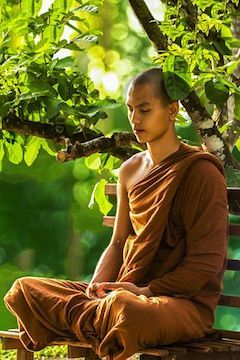The Buddhist 10 Fold Path

The Nikayas are Buddhist books that form the earliest Buddhist canon of scriptures containing the teachings of the Buddha.
Today we’re going to be examining the Eight Fold Path, and even more so, the Ten Fold Path that is not as well known.
First of all, it really helps to have these books in digital form, so you can search for a particular word easily and be able to read how it is mentioned and in what context it is placed in the teachings of the Buddha.
The following English translations of the primary texts are available and used:
The Connected Discourses of the Buddha: A Translation of the Samyutta Nikaya (SN)
The Long Discourses of the Buddha: A Translation of the Digha Nikaya (DN)
The Middle-Length Discourses of the Buddha: A Translation of the Majjhima Nikaya (MN)
The Numerical Discourses of the Buddha: A Translation of the Anguttara Nikaya (AN)
The Eight Fold Path consists of:
- Right view (samma ditthi, but also samma dassana)
- Right intention (samma sankappa)
- Right speech (samma vaca)
- Right action (samma kammanta)
- Right livelihood (samma ajiva)
- Right effort (samma vayama)
- Right mindfulness (samma sati)
- Right concentration (samma samadhi)

The Ten Fold Path consists of two additional ‘folds’:
9. Right knowledge (samma nana)
10. Right liberation (samma vimutti)
1. RIGHT VIEW
Right view is a supporting factor for the growth of Buddhist wisdom. This particular view is so important that it was placed right at the start of the path. Right view pertains to the view towards understanding the teachings of the Buddha as they really are. With this right view one is considered a trainee or stream-enterer, who is on their way towards the goal and of the Path. It is seen as a breakthrough to the rest of the teachings that are on the Buddhist path.
In the Anguttara Nikaya the teachings mention the application of right view:
“Monks, I do not see even a single thing on account of which unarisen wholesome qualities arise and arisen wholesome qualities increase and expand so much as right view. For one of right view, unarisen wholesome qualities arise and arisen wholesome qualities increase and expand.” — AN I.30

In relation to suffering and the cure to the arising of suffering, the right view and the whole Eight Fold Path plays a fundamental role in overcoming suffering. By the acquisition of right view, one can overcome all suffering in this life. This view is quite precise and requires ‘hitting the mark’ when compared to a sharp-shooter in the Anguttara Nikaya:
“Just as the warrior is a sharp-shooter, so too the noble disciple has right view. The noble disciple with right view understands as it really is: ‘This is suffering.’ He understands as it really is: ‘This is the origin of suffering.’ He understands as it really is: ‘This is the cessation of suffering.’ He understands as it really is: ‘This is the way leading to the cessation of suffering.” — AN II.202

These four understandings are what the four noble truths are all about and key to Buddhism.
Possessing right view is one of the four qualities that’s part of one’s practice:
“Monks, a monk who possesses four qualities is practicing the unmistakable way and has laid the groundwork for the destruction of the taints. What four? The thought of renunciation, the thought of good will, the thought of non-harming, and right view. A monk who possesses these four qualities is practicing the unmistakable way and has laid the ground-work for the destruction of the taints.” — AN II.76

Right view can’t do it all by itself. It needs a few helpers, or assistants who factor in as benefits to the goal that right view starts with:
“Monks, when right view is assisted by five factors, it has liberation of mind as its fruit, liberation of mind as its fruit and benefit; it has liberation by wisdom as its fruit, liberation by wisdom as its fruit and benefit. What five? Here, right view is assisted by virtuous behavior, learning, discussion, calm, and insight. When right view is assisted by these five factors, it has liberation of mind as its fruit, liberation of mind as its fruit and benefit; it has liberation by wisdom as its fruit, liberation by wisdom as its fruit and benefit.” — AN III.21
Another term to be introduced is kamma, which is a difficult word in-and-of-itself that will require a separate post to go into more detail. In short, kamma is action and it’s result. Sort of like cause and effect. The best type of kamma, as described in the texts, is the type of action that is neutral:
“And what is kamma that is neither dark nor bright with neither-dark-nor-bright result, kamma that leads to the destruction of kamma? Right view, right intention, right speech, right action, right livelihood, right effort, right mindfulness, and right concentration: this is called kamma that is neither dark nor bright with neither-dark-nor-bright result, kamma that leads to the destruction of kamma.” — AN II.237

Overall, right view is crucial as the start of the Eight Fold Path of Buddhism. It is an antidote to the idea of wrong views that are discussed as well:
1. Past-action determinism, deterministic theism, and denial of causality (AN I.173)
2. There is no fruit or result of good and bad actions (AN V.265)
3. The determinist view that our decisions are irrevocably caused by factors and forces outside ourselves. (AN I.287).
And this is just a small portion of the views that are considered wrong. The Brahmajala sutta in the Digha Nikaya (DN I.13) has a mega list of 62 types of wrong views! All of which have been dealt with by the Buddha effectively.
In the next post No. 2 of the path will be discussed: Right intention.


 A link to My Blog
A link to My Blog
I left Steemit a week ago ,When I returned The first publication I saw is this article
Wow... serendipity, nice to see you @hassanben!
Thank you for this information about the Law of Buddhism
What is your view on who is Islamic and Muslim?
@klasanaj, I think there is cultural Islam and there is religious Islam and many views in-between. Just like Christianity, Judaism, and Buddhism. All the muslims I know come from Iran and some called themselves Persian not muslim but some of their relatives were muslim. But I didn't pay attention to their religion I enjoyed their lovely personalities and how kind they were to me.
This is the site I learned about everything I know about Islam, which is not a lot.
http://www.sophiaperennis.com/category/books/islam/
What religion do you follow?
Do you believe in a new life after death?
Do you believe in paradise and fire?
I am a Buddhist, I studied Theravada through vipassana mediation and the satipathana sutta, I studied Mahayana through the Son Tradition of Korean Zen and took my Bodhisattva vows and studied the Prajnaparamita. I have several teachers from the Tibetan tradition of Vajrayana and I practice Dzogchen...
I have no belief in a continuing personality I call me but I do believe there is something beyond my limited senses that is not a thing and not the conditional me that continues on after death....
Does that make sense @klasanaj
For you, you are logical because you have studied and educated on the Boudieh
For me I'm not logical
Putting mediation between me and God.
What are the rituals on which the buddhism is based? Is it related to the Hindu religion
Meditation for me clears the way to see God as reality truly is not as I wish. I have done many meditation retreats, mostly 10 day retreats meditating 10 t0 14 hours a day on breath and body sensation. I have seen the body and all my feelings, sensations, and thoughts are constantly changing. What is constantly changing is not me or mine
We all have a natural right to our belief and faith.
The rituals are not based on Hindu Religions which are numbered in the 1000s. The rights and rituals are based in the culture in which Buddhism migrated but all are aimed at clearing away wrong view to see reality as it is and attain freedom from suffering. The Theravada tradition aims at individual freedom called arhat attaining Nibbana without becoming a Buddha. The Mahayana and Vajrayana tradition aim at the Bodhisattva vow of becoming a Buddha and helping all sentient beings become free of suffering.
The Dalai Lama is the father of the Buddhists, so to speak, just as Francis is the Pope of the Christians. His speech is heard not only in Tibet, but in all parts of the Buddhist world, but beyond. He is one of the wise men of the present age and one of the great spiritual figures who is respected worldwide. The Dalai Lama is his title, not his real name, literally "Sea of Science" or "Sea of Wisdom". His real name is Tanzan Gyatso, which means nothing to others and no one knows him.
In this study I will rely mainly on his book "Islam, Christianity and Judaism: How can we live in peace? Towards universal brotherhood between religions. " This religious leader sees that the peculiarity of Islam that distinguishes him from others lies in that very strong relationship between the Muslim and his Lord. Here there is absolute and unconditional acceptance of the divine transcendence of language, thought and body. This transcendence of the Lord accompanied by the approaching of God from the believer as the Quranic verse says: «.. We are closer to the vein of the vein». Thus, God is near and far at the same time. Islam asks its followers to believe in the infinite and eternal nature of God. Any portrayal of God is forbidden, because that encourages the worship of idols which Islam categorically prohibits. Therefore, there are no pictures in Islamic places of worship. It is characteristic of this religion that the Muslim surrenders himself completely to the divine will and is subject to it without discussion. Hence came the word «Islam»
I have read many of the Dalai Lama's teachings although he is not my teacher I have great respect for his ability to teach and his qualities as a person.
Buddhism used to have no images of the Buddha except his feet he does not leave a foot print or mark because he is free from the rounds of rebirth, he is free of kamma/karma....
Images and rituals in all of buddhism are only a reminder of the the Dharma teachings and to establish faith. There is no worship of deities to bring one to heaven or freedom. As Buddhist it is up to the individual effort to break from the rounds of rebirth and suffering from negative conditioning.
This is a different view from all other religions that the individual must win freedom and no god can help....
amazing topic to talk about, it's well know that buddhism is much more than life a style, it teach us the best ways to live stright peacful life, at the level of sprituality. happy to see more from you
@yassinof, the teachings also give protection to the mind against negativity. Along with the 4 Noble Truths and the Eightfold path are the virtues. They protect and heal the mind. I can honestly say that practicing the Paramitas saved my life.
https://en.wikipedia.org/wiki/Pāramitā
Very nice insightful post my friend...Would love to read about the intention.
Thank you @xabi, this is my favorite kind of post and I am glad you enjoyed it! Right Intention sets up everything else along the path!
I remember being introduced to Buddhism as part of a religion course I took. This goes into more depth. Thanks for sharing this @reddust.
@enjoywithtroy we will be going a lot deeper, just remember to breathe, I promise you won't drown <3
right view or The right direction in buddhist : free of the power of lust and pleasure, when taking any action.
My first teacher was a Monk from Korea called Sunim...One of my first questions to him was, "What does Right mean? Is it like, turning right?" hahahaha
Sunim didn't speak very good English so he gave me English translated Dhamma text to research and I taught him English. I think I got more out the deal!
One word changed the concept lol
I am glad I figured out what right really meant or I would be taking a right turn all the time and end up going in circles...hahaha
The buddhist been an ancient religion has a unique way and pattern. They believe in equity and justice, truth and honesty and the way of righteous path. Monks are sacred being who do hold the key to the spiritual realm and always concentrate their life to humanities.
I love the above quote.
I know, I love that quote too @fadiji09...It reminds me of gardening. You plant bitter seeds you will get bitter fruit. If you plant sweet seeds you will get sweet fruit. Thank you for a thoughtful reply <3
I have a lot of similar traits in my view of the world.
Maybe in my past life, I was a Buddhist monk lol.
I thought you were a Buddhist monk :p Thank you @yaan....hahahaha
Maybe I am, but just don't know about it :D
wow you seem to know a lot
@steemitwarrior, I am like a parrot, I can write these things but it does not mean I truly know what I am writing about. I hope I don't embarrass my teachers...hahaha
Thank you <3
Hello, How are you? I hope you are fine. I missed you. How are you. My blood is sparkling. Madam. Amazing publication. Thank you. I loved this very much.
I am glad to see you again @faissalchahid, I am doing great and I hope you are too! When you said sparkling blood I thought of champagne....hahaha
Thank you and I hope I haven't confused you and this post brings you happiness.